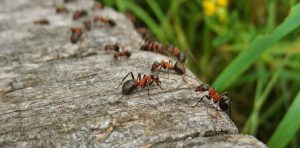Ants can be quite the troublemaker at home. These insects can get in your food, clothes, and bedding, making your life miserable. And being very large in numbers, removing ants from your house may seem like an uphill task. To help you with it, we will look at a few things you can do to get rid of the ants infesting your home.
Remove Food Sources
Like all other creatures, ants are also spending a considerable portion of their time looking for food. In fact, the very presence of ants in your home indicates that these insects are getting their food from somewhere in the house. So, follow the trail, find the source of food, and take it away. Clean the floors regularly to make sure that there are no scraps of food lying around. And if you have any leftover food at home, throw it out in the garbage can.
Block Entry Points
Look for any openings and cracks on floors and walls through which the ants are coming inside. Once found, seal them off completely. However, do keep in mind that you cannot completely avoid ants from entering your home since they are tiny insects and can enter from a variety of openings like chimneys, windows, and so on. But by sealing off the cracks and crevices, you will block out several openings through which the ants could have come in, thereby making your home more protected from these pests.
Check The Pets
If you have pets that spend a considerable amount of time playing outside in the garden, then you must inspect them before letting them inside the home since ants could be present in their body. Now, remember that just a couple of ants that get inside the home can lead to an infestation very soon. So, brush your pets thoroughly to shake off the ants clinging to their hairs.
Destroy The Nest
A surefire way to prevent ants from entering your home is to find their nest and destroy it. And for the purpose of extermination, you can use a pesticide. Just ask the store owner for a good pesticide to kill off the ants and they will recommend you a good one. Once you buy it, mix it up with some water and pour it into a spray bottle. Go to the ant’s nest and spray the pesticide directly into it. This should kill the ants in the colony. Make sure to cover your face so that the pesticide does not hit your face while spraying. Another way to get the ants out from the nest is to pour some warm soapy water into it. This should force the ants to get out from their nest and move away.
Wipe Out The Trail
Ants leave a unique scent that allows other ants to follow them. This is why ants are able to form a long trail. Just clearing the ants off the trail is not enough since these insects can easily regroup and form the trail once again. A good way to wipe out the trail is to use vinegar. Mix up some vinegar with three times the water and spray the solution on the trail. The scent of vinegar should confuse the ants and break the trail apart, scattering them in all directions. However, if your ant infestation is pretty serious and you are unable to end it on your own, then you should try calling a pest extermination service like NaturaPestControl.com. With several years of experience behind them, they will be able to make your home completely ant-free. Plus, they can identify potential risk areas that might invite an ant infestation once again. Just heed their suggestions and you should be able to avoid such possibilities.
Bait Them
You can also use a bait to attract and kill ants. A safe method is by mixing some sugar with borax. Place it in spots that see a high ant activity. The ants will take the poisoned mix to their nests. And when they eat it, the borax will start affecting their digestive system. Eventually, all the ants will die.
Diatomaceous Earth
Diatomaceous Earth (DE) is an organic material made from the remains of certain plants which are similar to algae. When ants ingest the DE, they will start dehydrating and die out. Plus, the edges of DE are very sharp for the ants and will cut through their body. Remember to buy DE that has been certified to be used for pest control and avoid ones that are manufactured for swimming pools.











